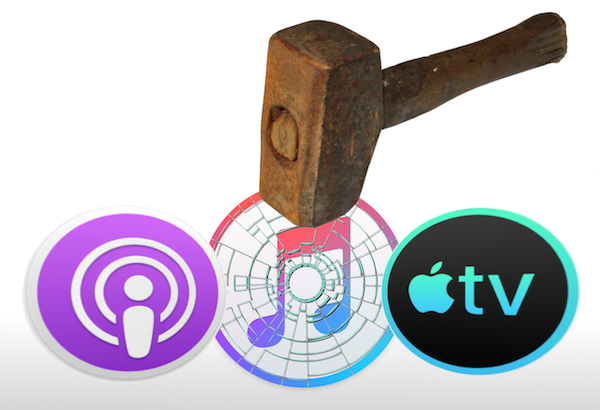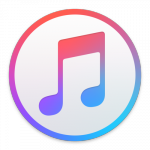Is Apple splitting up iTunes? Here’s how they’ll do it
Posted on
by
Kirk McElhearn
 Rumors of Apple dismantling iTunes are almost as old as the software itself. I can remember people clamoring for its destruction back when Apple added video management to the app, claiming that since it’s called iTunes, it shouldn’t manage anything but music.
Rumors of Apple dismantling iTunes are almost as old as the software itself. I can remember people clamoring for its destruction back when Apple added video management to the app, claiming that since it’s called iTunes, it shouldn’t manage anything but music.
That’s a fair point, to be honest. But according to that logic, the iPhone should change its name, since it does more than make phone calls; the Apple Watch should be rebranded; and the iPad isn’t even a pad, so what’s that about?
UPDATE: No, Apple isn’t killing off iTunes
The linguistic argument for the break-up of iTunes is by far the weakest, but there have been others over the years, notably that iTunes is “bloated.” When someone claims that, they essentially mean that iTunes has features that they don’t need. They don’t say the same thing for, say, a photo editor, a text editor, or an email client. (Seriously, who ever “redirects” their email?) I’ve addressed this issue many times, but many people continue to claim that because it has a lot of features, iTunes should be broken up like a monopolistic corporation.
A recent report on 9to5Mac suggests that Apple is, indeed, planning to release standalone apps to replicate some of iTunes’ features. Some people have found “evidence” of this, and others have confirmed this with “sources;” plus, Apple has already announced that there will be a TV app for the Mac in the near future. But does this mean that Apple is going to break up iTunes and placate the bloat-truthers? Probably not.
What iTunes manages
iTunes manages a lot of different types of content:
- Music
- Movies
- TV shows
- Podcasts
- Audiobooks
It used to also manage iOS apps (as a desktop interface to the mobile App Store), ringtones, and e-books, but the latter was broken out to a standalone Books app (initially called iBooks) with OS X Mavericks, and Apple nixed the app and ringtone management functionality in iTunes 12.7.
 iTunes serves three distinct purposes for these different content types: it allows users to purchase content, manage their libraries, and play or read that content.
iTunes serves three distinct purposes for these different content types: it allows users to purchase content, manage their libraries, and play or read that content.
The iTunes app also synchronizes content between a computer and iOS devices, and provides its library of content to be shared over a local network.
While more and more people stream content—they don’t manage a local library any more—there are probably many millions, if not tens of millions of people, who still do manage local media files on their computers.
Apple’s plan
![]() We’ve already seen with Apple Books that the company could create an app that users could use to buy books and manage them, while this content was still synced through iTunes. It’s trivial for them to do this: for iTunes to sync content, it merely needs to read a library file, and whether it’s one file for the entire iTunes library, or individual files for different content types makes little difference. (This would have made more of a difference some years ago with slower processors and spinning hard drives; the economy of a single library file made reading this file more efficient.)
We’ve already seen with Apple Books that the company could create an app that users could use to buy books and manage them, while this content was still synced through iTunes. It’s trivial for them to do this: for iTunes to sync content, it merely needs to read a library file, and whether it’s one file for the entire iTunes library, or individual files for different content types makes little difference. (This would have made more of a difference some years ago with slower processors and spinning hard drives; the economy of a single library file made reading this file more efficient.)
![]() So if Apple releases an Apple TV app for the Mac, to purchase, rent, and view movies and TV shows, iTunes will likely still be the backend for managing local files (such as home movies or DVD rips), and for syncing. The same is the case for a standalone Music app. Why not create an app that replicates the iOS Music app, allowing users to play music from Apple Music, and to manage music in an iCloud Music Library? (In my music podcast, The Next Track, my co-host Doug Adams and I discussed how this would work.)
So if Apple releases an Apple TV app for the Mac, to purchase, rent, and view movies and TV shows, iTunes will likely still be the backend for managing local files (such as home movies or DVD rips), and for syncing. The same is the case for a standalone Music app. Why not create an app that replicates the iOS Music app, allowing users to play music from Apple Music, and to manage music in an iCloud Music Library? (In my music podcast, The Next Track, my co-host Doug Adams and I discussed how this would work.)
![]() And why not do the same for podcasts? If anything, podcasts are the easiest type of content to split out of iTunes, because for many people, they are disposable. You subscribe to podcasts, you listen to episodes, then you move on; most people don’t keep a library of podcast episodes (though some certainly do).
And why not do the same for podcasts? If anything, podcasts are the easiest type of content to split out of iTunes, because for many people, they are disposable. You subscribe to podcasts, you listen to episodes, then you move on; most people don’t keep a library of podcast episodes (though some certainly do).
![]() And if iTunes were split up entirely, how would people sync and back up their devices? With another app, perhaps called iSync? (Long-time Mac users may remember that app from back in the day.)
And if iTunes were split up entirely, how would people sync and back up their devices? With another app, perhaps called iSync? (Long-time Mac users may remember that app from back in the day.)
Many people never sync their devices, but plenty still do, and a local iTunes backup is an essential part of a serious backup plan. Thus, iTunes will almost certainly still exist to back up and sync iOS devices. (And having a single folder with all your iTunes media also makes it easier to back that up as well.)
Apple likely won’t change iTunes much, but leave it as the back end to manage files locally: all those CDs you’ve ripped, all the tracks that you’ve downloaded from the iTunes Store or other vendors, home movies, DVD rips, and more. No matter what the future holds, many people will want to edit or change metadata for their media files, and this isn’t possible with the native apps on iOS.
The new apps—let’s say TV, Music, Podcasts, and a revamped Books app which will likely include audiobooks—will all just be another way of playing or viewing the same content. Other than the Books app, which already exists, these new apps will likely use Apple’s Marzipan framework, which allows iOS apps to be easily ported to the Mac; we’ve already seen four such apps in macOS Mojave: News, Home, Stocks, and Voice Memos.
But there’s just one thing…
There’s another big problem with the idea that Apple would abolish iTunes and replace it with separate, specialized apps.
 Don’t forget that a significant number of iTunes users run Microsoft Windows. Would Windows get standalone apps, too?
Don’t forget that a significant number of iTunes users run Microsoft Windows. Would Windows get standalone apps, too?
That seems doubtful; I think this is a Mac-only strategy, because of the ability to easily port iOS apps to macOS using Marzipan. The future could hold a similar type of app on Windows, but I wouldn’t expect it any time soon. And the fact that so many iTunes users run Windows is probably the main reason that Apple has no short- or medium-term plans to get rid of the iTunes app.
So those of you who want to drive a stake through iTunes’ heart, don’t start rejoicing yet. iTunes will likely be around for many years to come, and perhaps it’s time to choose another fight. If you don’t use all of iTunes’ features, just ignore them. They don’t get in your way, and if you’re a Mac user, you may soon have new alternatives to make it easier to access and play your media.
How can I learn more?
 We discuss the iTunes debate on this week’s episode of the Intego Mac Podcast, so be sure to subscribe to make sure you don’t miss the latest episode. You’ll also want to subscribe to our e-mail newsletter and keep an eye here on The Mac Security Blog for updates.
We discuss the iTunes debate on this week’s episode of the Intego Mac Podcast, so be sure to subscribe to make sure you don’t miss the latest episode. You’ll also want to subscribe to our e-mail newsletter and keep an eye here on The Mac Security Blog for updates.
You can also follow Intego on your favorite social and media channels: Facebook, Instagram, Twitter, and YouTube (click the ? to get notified about new videos).
Images of potential macOS Apple TV and Podcasts apps via 9to5Mac. Shatter pattern and hammer: public domain, via Pixabay. Apple icons and logos and the Microsoft Windows logo are the property of their respective rights holders.